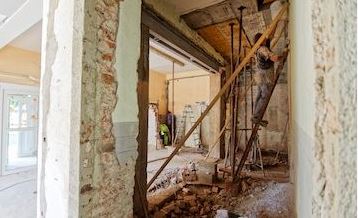You’re in the perfect location, so it might make sense to invest in what you’ve already got. Your first problem; improve and expand, or rip it down and start over?
If the location suits, and you love the form and function of your place, renovating might be the answer. But if you’re running out of room, or if the look and feel of the place is outdated, a new build on the same block could be for you.
Either way, you could be spending now to add some serious value in the future. Here is what to consider before you make the call.
Know the lay of the land
First up, make sure you do your due diligence. Whether renovating or building, you need to know what kind of development application to submit for approval.
How is your property zoned? If your home has a heritage overlay or listing, then that may affect the scope of your project, what you can build and the materials needed. It could even mean keeping existing fences or trees. In such cases it may be worth consulting a heritage advisor.
You’ll also need to meet local planning regulations, which can dictate building heights, setbacks and materials. And your designer or architect can help you make sure you get this right. Once you have an idea of what’s possible, you can start to think about the cost.
Budgeting your build
A significant renovation could cost more than a rebuild – thanks to the added challenges of fitting a new design to an existing structure and potentially dealing with outdated materials, electricals and plumbing. A good rule of thumb is that if the work will amount to more than half of the value of the property, then it’s probably wiser to knock down and rebuild.
A full rebuild may mean you’re creating your “forever home”, so you might not be concerned about resale. But if you’re looking to sell in the future, it’s important to make sure you don’t overcapitalise. After calculating the renovating and the rebuilding cost, estimate the new market value after completion. That can help you decide if a new build is worth the effort.
“A good rule of thumb is that if the work will amount to more than half of the value of the property, then it’s probably wiser to knock down and rebuild.”
And it’s important to factor in all the costs. House plans from a draftsman can cost less than an architect but could still cost $5,000 or more for a small project. An architect’s fees on a $300,000 renovation could run to $15,000 or more – and that’s before any ongoing fees for site visits or managing the build. Plus, you’ll need to factor in costs such as surveying, soil testing, demolition fees, a planning consultant, a project manager and a place to stay while the renovation is underway.
Depending on the project, minor renovations can cost as little as $20,000. However, costs can quickly run to $300,000 or higher to extend or completely transform a home. Considering a new single-storey home can be built from $200,000 and a two-storey home from $250,000 depending on the design, that may be a better option in the long term.
If you’re on a smaller block, then maybe your only option is to extend upward – which will generally cost more than single-storey extensions. If you’re considering this, you need to make sure the existing foundation can support a second floor.
Expect the unexpected
It’s an unavoidable truth of home improvement that your project will change in scope as it develops, because so many variables are involved. Unforeseen structural issues and problems that emerge from outdated wiring or plumbing, or finding asbestos, could see your costs balloon rapidly. Rebuilds can be a simpler option, but can still bring unwanted discoveries.
Family matters
Both renovations and rebuilds can take between six and 18 months. A renovation might mean you can live in the house throughout – depending on the amount of space you need – but a new build on an existing block means you’ll need to move your family and possessions somewhere else.
Don’t forget to factor in the cost of renting a temporary home, removalist fees and potentially storage and insurance. And you’ll need to make sure your family is ready for big changes, too.
When you’ve made the decision about how you want to create your dream home, talk to Conquer Finance about how to make financing your renovation as simple as possible.



